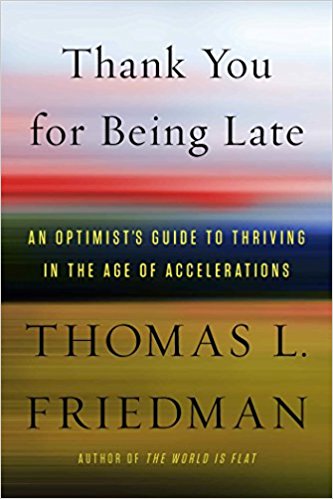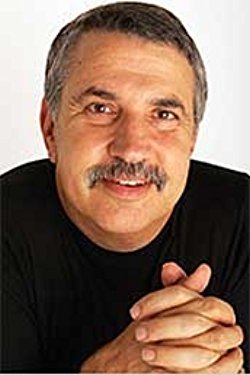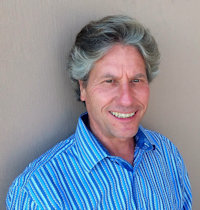Thank You for Being Late: An Optimist's Guide to Thriving in the Age of Accelerations

from amazon.com
We all sense it—something big is going on. You feel it in your workplace. You feel it when you talk to your kids. You can’t miss it when you read the newspapers or watch the news. Our lives are being transformed in so many realms all at once—and it is dizzying.
In Thank You for Being Late, a work unlike anything he has attempted before, Thomas L. Friedman exposes the tectonic movements that are reshaping the world today and explains how to get the most out of them and cushion their worst impacts. You will never look at the world the same way again after you read this book: how you understand the news, the work you do, the education your kids need, the investments your employer has to make, and the moral and geopolitical choices our country has to navigate will all be refashioned by Friedman’s original analysis.
Friedman begins by taking us into his own way of looking at the world—how he writes a column. After a quick tutorial, he proceeds to write what could only be called a giant column about the twenty-first century. His thesis: to understand the twenty-first century, you need to understand that the planet’s three largest forces—Moore’s law (technology), the Market (globalization), and Mother Nature (climate change and biodiversity loss)—are accelerating all at once. These accelerations are transforming five key realms: the workplace, politics, geopolitics, ethics, and community.
Why is this happening? As Friedman shows, the exponential increase in computing power defined by Moore’s law has a lot to do with it. The year 2007 was a major inflection point: the release of the iPhone, together with advances in silicon chips, software, storage, sensors, and networking, created a new technology platform. Friedman calls this platform “the supernova”—for it is an extraordinary release of energy that is reshaping everything from how we hail a taxi to the fate of nations to our most intimate relationships. It is creating vast new opportunities for individuals and small groups to save the world—or to destroy it.
Thank You for Being Late is a work of contemporary history that serves as a field manual for how to write and think about this era of accelerations. It’s also an argument for “being late”—for pausing to appreciate this amazing historical epoch we’re passing through and to reflect on its possibilities and dangers. To amplify this point, Friedman revisits his Minnesota hometown in his moving concluding chapters; there, he explores how communities can create a “topsoil of trust” to anchor their increasingly diverse and digital populations
With his trademark vitality, wit, and optimism, Friedman shows that we can overcome the multiple stresses of an age of accelerations—if we slow down, if we dare to be late and use the time to reimagine work, politics, and community. Thank You for Being Late is Friedman’s most ambitious book—and an essential guide to the present and the future.
Author: Thomas L Friedman

Thomas L. Friedman has been awarded the Pulitzer Prize three times for his work with The New York Times, where he serves as the foreign affairs columnist. Read by everyone from small-business owners to President Obama, Hot, Flat, and Crowded was an international bestseller in hardcover. Friedman is also the author of From Beirut to Jerusalem (1989), The Lexus and the Olive Tree (1999), Longitudes and Attitudes (2002), and The World is Flat (2005). He lives in Bethesda, Maryland.
Reviewed by: John Stokdijk

Thank You for Being Late is a strange title for a book. But Thomas L. Friedman explains his choice with an interesting anecdote in the beginning pages of his latest book. One day he got a few minutes of unscheduled time to sit and think when a guest arrived late for a breakfast meeting.
Friedman wants us to sit and think about the big theme of his book. There are, he says, three large forces reshaping our world and they are all accelerating. Those forces are technological change, globalization and climate change.
The idea of accelerating change is not new. Decades ago I read Future Shock by Alvin Toffler which was published in 1970. But surely Toffler’s premise that "too much change in too short a period of time" is traumatic for human beings rings more true today than ever before.
Friedman identifies 2007 as a pivotal year in which technological change significantly accelerated. He explains Moore’s Law and the impact of exponential growth. The results are now familiar - iPhones, Twitter, YouTube, Airbnb, the Cloud and much more.
I hope to live for at least 30 more years. Accelerating change means that I will see more change in the next 30 years than I have seen in the past 30 years. In 1987 I could not have imagined buying Friedman’s book online and having it available on my iPad in less than sixty seconds. Likewise, I cannot now imagine what the world of 2047 will be like. That thought is indeed shocking.
I was not familiar with the term “black elephant” but I liked the way it was used to describe climate change.
A “black elephant,” it was explained to me by the London-based investor and environmentalist Adam Sweidan, is a cross between a “black swan”— a rare, low-probability, unanticipated event with enormous ramifications— and “the elephant in the room: a problem that is widely visible to everyone, yet that no one wants to address, even though we absolutely know that one day it will have vast, black-swan-like consequences.”
Far beyond the scope of this book, but of considerable interest to me, is the idea that the black elephant of climate change links to our intuitive knowledge that humans, collectively and individually, will inevitably die. Denial of this insight may be a barrier to solving the problem. Secular spirituality may possibly be a path towards overcoming that barrier and finding a solution before it is too late.
Friedman chose a clever title for Chapter 8 about artificial intelligence, Turning AI into IA. Turning artificial intelligence into intelligent assistance, intelligent assistants and intelligent algorithms as a means with which to solve the problems of the age of acceleration strikes me as simplistic and naive. However, I have nothing better to offer. But I do not share his optimism.
I agree with Friedman’s description of the state of the world today, dividing it into “the World of Order” and “the World of Disorder.” Which will overwhelm the other? This, in my view, is an open question, an unanswerable question. The assertion of Friedman - “Fact #1: The necessary is impossible. Fact #2: The impossible is necessary.” - does not reassure me.
In Chapter 10 Friedman shares with us the 18 solutions of Mother Nature to the problems of the age of acceleration. Of course, these are the solutions of Thomas L. Friedman himself which he projects onto her. I like these solutions, a reflection of my political alignment with the author. But why not embrace these ideas directly? Attributing them to the wisdom of Mother Nature does little to elevate their importance.
I greatly enjoyed the last three chapters of Friedman’s long book, although they seemed somewhat disconnected from the earlier chapters. He describes in detail the community and the state in which he was raised. St. Louis Park in the State of Minnesota (Minnesota Nice has a nice ring to it) shaped his life in profound ways.
Friedman intuitively concludes that pluralism is an important element of a vibrant community. After WWII St. Louis Park was welcoming to Jews but, unfortunately, this was not a widespread attitude in the USA at that time. A deep understanding of pluralism seems to be declining in America today.
Building pluralism, making one out of many, a great American tradition, does not happen automatically or easily. Real pluralism never comes easy, because it has to be built not just on tolerance of the other but also on respect of the other, trust of the other.
Friedman tried to capture the idea of rapid technological change as a supernova, not an effective label in my opinion. I found his use of the word in this way annoying and he used the word a lot! But I acknowledge that he is a very good writer, many levels above my skill level, and earned the right to write as he pleases long ago.
Friedman’s sub-title is “An Optimist's Guide to Thriving in the Age of Accelerations” but I do not think he makes the case for optimism in his book. Perhaps he is optimistic by nature but he did not inspire me with hope of a better future. My life experience tells me that the future is uncertain and unknowable, but this did not diminish my appreciation for Friedman’s effort.
Thomas L. Friedman remained an optimist to the end.
But it is impossible for me to believe that with so many more people now empowered to invent, compete, create, and collaborate, with so many more cheap and powerful tools enabling us to optimize social and commercial and governmental interactions, that we won’t develop the capability to solve the big social and health problems in the world... Of course, that is hard to see right now (emphasis mine).
Yes it is, Thomas. Yes it is.
Comments
6 years ago — John StokdijkThe July, 2019 ABC selection is 21 Lessons for the 21st Century by Yuval Noah Harari.
Two of the greatest thought leaders of the 21st century– Yuval Noah Harari and Thomas L. Friedman – discuss the Future of Humanity on March 19, 2018, with moderator Rachel Dry, The New York Times.
